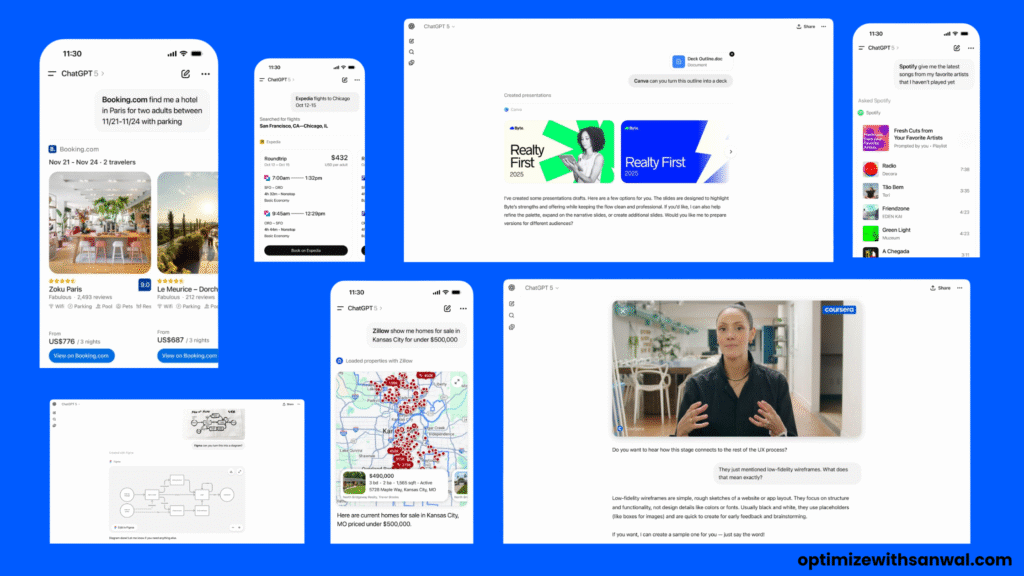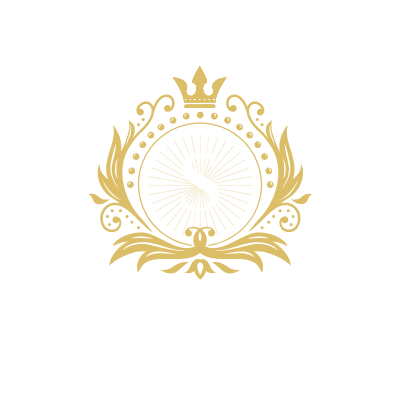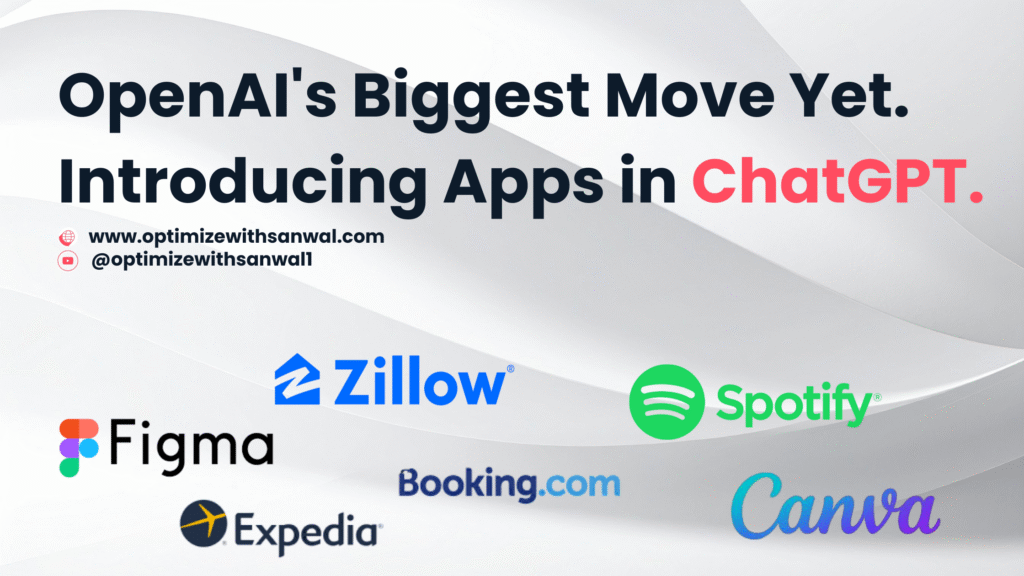On October 6, 2025, OpenAI announced a new feature that marks a major evolution for its flagship product: the ability to “chat with apps” directly within the ChatGPT interface. This is more than just another update; it’s a foundational shift from a simple chatbot to an interactive platform.
This guide is a deep-dive analysis of what this new app ecosystem is, the technology behind it, the strategic implications, and how you can start using it. It is a comprehensive look at a new generation of applications you can talk to.
How Are ChatGPT Apps Different From Previous Integrations?
For existing ChatGPT users, the immediate question is how “Apps” differ from the previous “Plugins” system. While plugins were primarily focused on pulling external data into a chat, Apps represent a more advanced, integrated experience.
The key difference is the introduction of interactive interfaces directly within the chat. Instead of just getting a text-based summary, you can now interact with maps, create slide decks, and build playlists using the app’s own visual elements, all without leaving your conversation with ChatGPT.
What Can You Actually Do With ChatGPT Apps?
The launch includes a set of pilot partners, with many more on the way, showcasing a wide range of capabilities.
Apps Available at Launch:
- Booking.com & Expedia: Find hotels, flights, and plan trips.
- Canva: Transform an outline into a slide deck or create other visuals.
- Coursera: Take a course and ask ChatGPT to elaborate on concepts in the video as you watch.
- Figma: Generate diagrams directly from a text description.
- Spotify: Build playlists based on your music taste.
- Zillow: Browse home listings on an interactive map inside the chat.

Apps Coming Soon: OpenAI also announced 11 more partners that will launch later this year, including AllTrails, DoorDash, Instacart, Khan Academy, OpenTable, Peloton, Target, TheFork, Thumbtack, Tripadvisor, and Uber.
How Do You Use and Manage Apps in ChatGPT?
The system is designed to be intuitive. There are two primary ways to use an app:
- By Calling its Name: You can start a message with the app’s name, like “Spotify, make a playlist for my party this Friday“. ChatGPT will automatically surface the app and use the context from your message to help.
- Through Contextual Suggestions: If you’re having a conversation about a relevant topic, like buying a new home, ChatGPT can proactively suggest an app like Zillow for you to use.
The first time you use any app, ChatGPT will prompt you to connect, ensuring you understand what data may be shared.
What is the Technology Powering This New Ecosystem?
For developers, this announcement is particularly significant. The new feature is powered by the
Apps SDK, which is being released in preview.
This is not a closed, proprietary system. The Apps SDK is built on the
Model Context Protocol (MCP), which OpenAI is releasing as an open standard. The SDK itself is open source, meaning apps built with it are designed to run on any platform that adopts this standard. This allows developers to design both the logic and the interactive interface of their apps, connect to their own backend, and allow existing customers to log in.
Of course. Here is the rewritten section with a more in-depth analysis and an integrated call-to-action for your AI SEO services, as requested.
What Are the Strategic Implications of This Shift? (My Analysis)
This move by OpenAI is more than just a new feature; it’s a clear signal about the future of conversational AI. It represents a fundamental shift from AI as a reactive information-retrieval tool to AI as a proactive, action-oriented platform.
For users, this means less friction. The need to jump between multiple apps to plan a trip or create a design is replaced by a single, seamless conversation. For developers, this opens up a direct channel to over 800 million ChatGPT users, creating an entirely new ecosystem for app discovery and monetization.
For us as SEOs and marketers, the implications are profound. We are now entering an era of what I call ‘AI Engine Optimization.’ It’s no longer enough to just rank for a keyword. We must now ask:
- Is our content valuable enough for an AI to surface it proactively?
- Can our service be turned into an ‘action’ that an app can facilitate within a chat?
- How do we build a brand that users call by name inside ChatGPT?
In my view, this is where the real work for strategists begins. To thrive in this new environment, you need a forward-thinking strategy that goes beyond traditional SEO. If your business is looking to understand how to adapt and win as these changes happen, I specialize in building these kinds of AI-focused SEO strategies.
Contact Me to Discuss Your AI SEO Strategy
Frequently Asked Questions (FAQ)
- Are ChatGPT apps free to use?
- Yes, apps are available to all logged-in users on Free, Go, Plus, and Pro plans. However, the individual apps may require their own subscriptions for premium features.
- Is it safe to connect my data to a ChatGPT app?
- OpenAI has put safety measures in place. Developers must provide clear privacy policies and be transparent about permissions. Users are prompted to connect before any data is shared, and more granular controls are planned for the future.
- How can developers make money with ChatGPT apps?
- OpenAI has stated that they will share details on monetization soon. This will include support for the new
Agentic Commerce Protocol, an open standard that enables instant checkout directly within ChatGPT.
- OpenAI has stated that they will share details on monetization soon. This will include support for the new
About Me
I’m Sanwal Zia, a certified SEO strategist and the founder of Optimize with Sanwal. With expertise recognized by prestigious organizations, I focus on building effective search strategies that drive growth. You can connect with me on YouTube, my Website, LinkedIn, Facebook, and Instagram.


